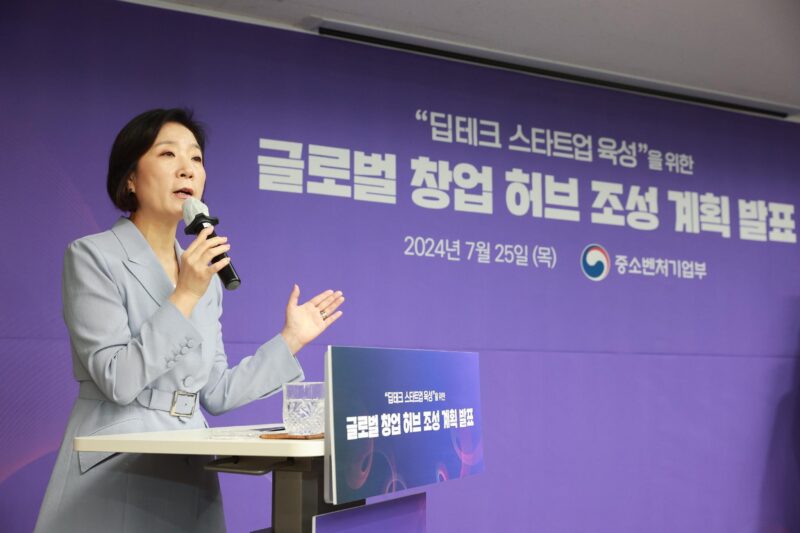Korea Unveils Plans for New Startup Hubs in Seoul and Busan
The Ministry of SMEs and Startups (MSS), led by Minister OH Youngju, announced on Thursday the selection of two sites for the establishment of Korea’s version of Station F, the world’s largest startup campus located in Paris, France. The new hubs will be located near the Hongdae area in Seoul and in the North Port area of Busan.

Station F, founded in 2017, provides housing and acceleration programs for over 1,000 startups. Korea’s adaptation of this model is part of the 2023 Startup Korea vision, aiming to support deep tech startups and enhance the global startup ecosystem. By establishing one hub in a metropolitan area and another in a non-metropolitan area, the initiative seeks to foster a balanced, open startup ecosystem across the country.
The Twin-Hub approach marks a shift from the previously fragmented startup infrastructure, enabling simultaneous growth in both urban and regional settings. MSS plans to bring together deep tech companies, investors, and support organizations, providing tailored assistance to actively nurture these startups. This strategy aims to allow non-metropolitan startups to enter the global market directly, thus reducing the ecosystem gap between metropolitan and regional areas.
Metropolitan Hub: Near Hongdae
The metropolitan hub will be located near the Hongdae area in Mapo-gu, Seoul. Following an extensive evaluation process involving around 100 potential sites, the Hongdae area was selected for its concentration of technology startups and proximity to major universities, including Yonsei University, Ewha Womans University, Sogang University, and Hongik University. The area’s high number of international students and excellent public transportation links make it a prime location for attracting both domestic and international startups.
Tentatively named ‘K-DeepTech Town,’ this hub will focus on nurturing deep tech startups, crucial in a tech-centered economy. The plan includes attracting global big tech companies, specialized venture capitalists, accelerators, and domestic and international deep tech startups to establish an Asia-leading Deep Tech Society. Additionally, a unique support program for entertainment technology will be launched to integrate K-content with deep tech innovations.
Design for the Hongdae hub will commence at the end of 2024, with remodeling set for 2025, and an official opening planned for the first half of 2026.
Non-Metropolitan Hub: North Port of Busan
The non-metropolitan hub will transform an abandoned warehouse in the North Port of Busan, symbolizing the region’s industrial heritage. Following a review process in March 2024, the North Port was selected from applications by seven metropolitan municipalities. The warehouse, built in 1978, will be converted into a startup hub by 2026.
Busan stands out for its potential growth in the startup ecosystem, with commercial, cultural, and park infrastructure appealing to young people and innovative startups. Excellent transportation links, including proximity to KTX Busan Station and Gimhae International Airport, enhance Busan’s attractiveness as a startup hub.
Investment in local startups will focus on strategic industries like digital finance and smart oceans, supported by the Busan Future Growth Venture Capital Fund (KRW 101.1 billion). The plan also aims to attract startups from metropolitan and international areas through open innovation programs in collaboration with local enterprises like Lotte and a work+entertainment program.
Twin-Hub Synergy
The two hubs will function as interconnected entities with joint membership and shared programs, leveraging metropolitan infrastructure and investment opportunities while encouraging startups to consider relocating to Busan.
Minister OH Youngju stated, “In response to the global competition for deep tech supremacy, we will undertake innovative design and rapid development to accommodate approximately 400 deep tech startups in the Korean version of Station F by 2027.” She added, “By simultaneously developing both metropolitan and non-metropolitan hubs, we aim to elevate our startup ecosystem to become Asia’s number one startup ecosystem.”
MORE FROM THE POST
- Seoul Launches Seven Key Strategies to Lead AI-Driven Industrial Transformation
- MSS Unveils $770M Fund of Funds to Boost Venture Investments, AI, and Regional Startups
- Korea’s MSS Launches Global Startup Center in Seoul to Support Foreign Entrepreneurs
- MSS of Korea Enhances Support for Super Gap Startups in AI, Quantum and Space Sectors
- ‘Startup Korea Fund’ launched with KRW 500 billion from government and private investors
Share
Most Read
- 1
- 2
- 3
- 4
- 5


Leave a Reply